- Home
- Maurice Magre
Lucifer Page 2
Lucifer Read online
Page 2
I saw once again the distant station in winter, the innocent eyes of the friend who was accompanying me. I was on the point of boarding the train. I was struck by the designs that the frost had made on the windows. In the midst of those polar landscapes there was a representation of a devil with his horns and his demonic laugh on the glass of my compartment. The eyes, under obliquely inclined eyebrows, were staring at me with an embarrassing fixity. I was so surprised that I thought it was a hallucination, and I said to my companion:
“Can you see anything on the window?”
“Nothing at all,” he replied.
A whistle resounded, I closed the door, and as the train pulled away I heard my friend on the platform shout:
“Yes, yes, I see. There’s a devil on the window.”
At first I had admired the subtle art deployed by hazard, but at length, I had suffered a sight irritation. The face paid no heed to the three or four other people sitting in the compartment, and was obstinate in looking at me. I passed my hand over the glass in order to get rid of it, but it was on the other side that the mysterious artist had worked. Then I put my face close to it and projected my moist breath. I only succeeded in magnifying the eyes and rendering the rictus of the mouth more intolerable.
I remember that I was about to brave the protests of the passengers and open the window in spite of the cold, in order to escape that obsession, when I was saved by the stopping of the train.
I had had difficulty forgetting that incident. It would, however, have disappeared along with the millions of cinematic images that constitute our lives if the ridiculous figure that had just appeared had not revived it suddenly.
I shrugged my shoulders. I blinked. I no longer had before me anything but Monsieur Saint-Aygulf’s house, which I had come to consider on that warm night in June.
I looked at my watch and resumed my walk. It was a little after eleven o’clock and the two sisters must be in the process of going to bed in the room that they shared and where they both slept. Perhaps they were already in bed and reading, each on their side, by the light of two lamps.
Two young women. Two lamps. My double amour. Good and evil. How harmonious it all was, and mysterious at the same time!
I stopped and passed my hand over my face as if to wipe away a certain expression of stupidity that sometimes settled there and remained there in spite of my efforts. I had just thought about the bodies of two young women, the grace of their bare arms, the contour and firmness of their breasts, which must appear under their nightdresses. It was June and the heat was excessive. Perhaps they had thrown back the sheets and were reposing with the abandonment that summer evenings procure.
At that moment I was brushed on the sidewalk by a man with a wooden leg, who was walking with a singular rapidity for an invalid. I thought that if I reached out with my cane with the curled-back handle toward the stem of his foot he would fall; he would cry out, think it an aggression, and the noise would make the shutters of the two windows open like eyelids. I would catch a glimpse of the origin of shoulders, the hollows of armpits, and a surge of slender upper bodies above the stone sill.
Folly! The fast-moving invalid had disappeared at the extremity of the street and I remained open-mouthed facing windows whose illumination had been abruptly extinguished.
Why had I come to prowl in that street? I was no longer at the age of such escapades. Monsieur Saint-Aygulf, the father of Eveline and Laurence, might emerge abruptly, see me and be astonished by my presence outside his house. For him, I was not a friend but a relative who attempted by constant effort to enter further into his intimacy. He believed that we were linked by our common appetite for mystery, and the admiration that I supposedly had for his ides. He always exposed them abundantly before me and I had hidden from him, thanks to a fashion of rounding the eyes, nodding the head and thinking about something else, the absolute scorn that his stupidity inspired in me. Many men, enveloped by the cloud of their vanity, do not perceive that it is their wife, their daughter or their mistress that one comes to seek out in their home.
Since I was there, I was in love. But with which of the two? I had never reached an understanding with myself regarding the significance of the word love. What I experienced could, strictly speaking, be called that. But to love two sisters at the same time! There was a sort of mystery in that.
It was Eveline that I desired more, first of all because I thought her inaccessible to all desire. She was a mystic. If she had been Christian she would have gone into a convent. He father had put the most foolish ideas into her head. I was not far from believing that she attributed a spiritual mission to herself. As if a spiritual mission could devolve to such a desirable body! But whether she was a missionary or not, that had no importance for me.
Eveline secretly considered that a man who has surpassed the age of thirty-five, who has attained that advanced age, ought to retire from life, become a hermit, what do I know? And I knew, without her ever having expressed it, that she deemed that I, in particular, ought not to permit myself to raise my eyes either to her, her sister or any other woman. I had understood that by the way she considered my temples, the attention she paid to counting my hairs, although numerous, and measuring the thinness of my neck, where my age was betrayed. That disdainful examination was not the act of someone who has a spiritual mission. She hated me, I was sure of it and I had also sworn...
But that oath was buried in the depths of my heart.
Laurence loved me. I declared that to myself without vanity. She had said several times, intentionally, in my presence, that young men did not interest her. That was a certain sign, not to mention the pressures of the hand, remarks with double meanings and the scene in the dining room. But if there was a balance and immaterial weights for weighing love, I loved Laurence less than Eveline. She was certainly not as pretty as her sister. Her features were irregular, her mouth too large and too sensual, her dazzling teeth evoked images of bites, and she had a slight bodily sway that made me think of a panther I had seen the previous year in a menagerie.
Then again, she was brunette and an invincible taste attracted me toward blondes. There were certainly glints of tawny gold in her hair, but not enough for my taste. Her principle fault was her lack of intelligence, or rather, the kind of intelligence that I like. There was nothing mysterious about her. It was said of her that she was an absolutely material creature. I had seen her eat with an astonishing appetite.
She made fun of the efforts of her father and sister to communicate with the beyond; she considered as scatterbrains the members of the group of Essenes and students of ancient religions and their mysteries. She made an exception for me because in her presence I was able, by raising a corner of my mouth or by a skillful wink, to make her suppose that I was only a false believer, a slightly ironic enthusiast who only came to her father’s house for her.
I loved Laurence less than Eveline, but when I thought about her natural independence, a kind of rebellion against everything that she allowed to burst forth in her speech and was betrayed in her movements, I loved her more, because I have always been seduced by rebellion, although personally rather servile to the prejudices of society.
I knew that Laurence did not have the same mother as Eveline, and that Monsieur Saint-Aygulf had collected her at the age of eight in order to save her from poverty. Like a plant whose roots are steeped in a fecund compost, she had retained from her early years something vivacious, audacious and unhealthy, which rendered her more attractive to me The virtuous monster, the flat-haired torturer that Madame Saint-Aygulf was, had martyrized her on the grid of family duties, with the wheels of good intentions. She had even had her locked up for a few years in a house of correction.
But Eveline the pure and proud had received from nature elevation of mind as well as the gift of a perfect body. I could not think without shivering about her ash-colored hair, which she had not cut, about the curve of her neck, the radiation emanating from her person, which stole the
quality of transparency from the fabric of dresses, rendering them as heavy and unliftable as the veil of chastity.
If I was here it was because a presentiment had pushed me, in which case it was necessary that something would happen. The idea of returning home after the futile contemplation of a house whose two illuminated windows had just been extinguished was utterly insupportable to me. I nearly launched myself toward the door shouting: “Laurence! Eveline!” careless of the possible appearance of an irritated and amazed father.
It was a perfume of acacia that stopped me. A flowery branch emerged from a wall and allowed to fall upon me an insipid odor of sex and spring. I wanted to cut that branch, but it was too high. For the second time in a few minutes I experienced the utility of the crooked handle of my cane. I held it by its extremity, congratulating myself internally for the poetic idea of at least bringing back a flower from my nocturnal excursion.
It was at that moment that I heard a slight noise at the door of Monsieur de Saint-Aygulf’s house. I stood there motionless. The door opened, and while the flowering branch returned skywards, the silhouette of a woman appeared on the threshold.
I was in the shadows and I could not be seen. My first thought was joyful. Then I had a presentiment. It was a secret warning that had impelled me to come. A counselor full of wisdom was hidden in my unconscious. My second thought was anxious. What ought I to do? Ought I to run? And first of all, who had just come out of the house?
The door had closed again and the silhouette—Eveline or Laurence—slid along the street rapidly. Instinctively, I hastened behind her. The summer mantle that I saw floating in the distance prevented me from seeing which of the two sisters I was dealing with. Might it not, in any case, be a chambermaid? I rejected a hypothesis that negated the value of the presentiment. Then again, the family resemblance that the two sisters had was visible in the gait.
It was only at the corner of the street that my heart began to beat faster, as at the announcement of some disagreeable news. Why was a young woman leaving her house furtively like that in the middle of the night? The precaution she had taken in not making the door click indicated that she wanted her father to remain ignorant of her departure.
I thought about turning right, reaching a lighted avenue that I had crossed in the evening, and then doubling back. I would find myself face to face with the person I was pursuing and would seem to be encountering her by chance. I reflected on the breathlessness that would result. And there was a risk of losing her.
As those thoughts succeeded one another, a taxi emerged slowly from the shadows and I saw the young woman signal it. She opened the door and climbed in, with a feline movement that allowed me to recognize her. It was Laurence.
Hazard dictated that a second taxi emerged from the same shadows, into which I climbed, and which launched in pursuit of the first on my order.
What I experienced comprised an equal mixture of dolor, because Laurence might be about to escape me, and delight because I was on the track of an enigma.
On the way, I tried to deceive myself: Women are all the same. Fundamentally, I had divined that. And in any case, what did it matter?
I had divined nothing. I found that that event was very important. My bitterness was increasing. I saw as if in a dream the wine-shops with their terraces overflowing on to the pavement, the busy waiters, the consumers mopping their brows. One sensed the atmosphere of sad joy that the first heat wave spreads over Paris. I suddenly perceived that one of the taxi’s windows was raised. I brought it down with and irritated gesture, but without looking to see whether a mist had traced some design thereon.
“It’s really that,” I murmured, without knowing why, when I saw that we were approaching Montmartre. A fairground was in the process of installation there. I saw wagons with minuscule windows, square masses covered in gray canvas, dismantled wooden horses lying on the ground. A crowd was dispersing outside the hippodrome.
Who knows? I said to myself. Her father or sister might be ill, the telephone might be out of order and she’s gone to fetch a doctor to bring him back immediately.
Alas, slightly before arriving at the Place Blanche her vehicle stopped. I made a sign to my driver to stop too. I noticed from a distance that Laurence seemed entirely at ease and, while waiting for her change, she looked to the right and left with a tranquil curiosity. She crossed the boulevard with a light step and headed for the Moulin Rouge.
I had the feeling that he heat was increasing. The café orchestras evoked in dying away the languors of a casino. A rotating fire, which came from I know not what luminous advertisement, launched regular flashes. I was brushed by a late night tram. It was overflowing with petit bourgeois who, because they had spent their evening at the cinema, gave the impression of weary party-goers. A murmur of drunkenness rose up around me and I suddenly felt tired and futile. The sky was riddled with indifferent stars.
Laurence did not go into the Moulin Rouge. Without any hurry, she was now going past cafés full of frightful men whistling at the women who went past them on the sidewalk. The Rue Lepic was cluttered with creatures selling newspapers, buying or eating oranges, hirsute bohemians, hunchbacks and women with the faces of ghosts. Laurence went through that bizarre population, to which theater exits give birth on the pavements of Montmartre as if it were part of them. Her manner was so casual that I would not have been surprised to see her exchanging handshakes of greeting right and left.
Abruptly, she disappeared into a café. It was a rather ill-famed establishment, a meting-place of prostitutes and drug-dealers. I was struck as if by a beam of light. Cocaine! Was it not that for which she had come in search? I strove to peer over the heads of the customers sitting on the terrace and I saw Laurence marching through the tables inside, supple, her head slightly tilted forward, looking at the people in the process of drinking beers like a panther about to pounce, a hooker on the point of sitting down next to a man who gives her a sign.
Curiosity suppressed anguish within me. Two louts, fairly good-looking fellows with shaven faces, made her an inviting gesture. One of them half rose to his feet, pointing to the banquette beside him with his reversed index finger, and I glimpsed in his eyes and laughter the idiotic expression men have when they are making a proposition to a woman they do not know.
Laurence did not even twitch her shoulder. Having looked them in the face, she passed on, with a total absence of response to the invitation, as if the material image of the two louts had been imperceptible to her senses.
There had been no purchase, no sale, no furtively slipped package.
I was obliged to step aside abruptly, and it was by chance if Laurence did not see me. She went past me and I sensed that she darted a long glance at the people distributed outside the café, as if to examine them.
She was looking for someone. But who? Who had been able to give Monsieur Saint-Aygulf’s daughter a rendezvous as singular as that café haunted by shady individuals, policemen and drug-dealers? But then I realized that the rendezvous was not in that specific place—that it was a vague rendezvous in one of the cafés surrounding the Place Blanche, for I saw her push a door a little further along. She hesitated in the doorway for a moment, darting a circular glance around a smoky interior, and then she resumed her course on the sidewalk.
A little further on, she stuck her face to another window. She stopped outside an almost-empty wine merchant’s, and as a short fat man with a ruddy race and a jovial expression looked at her slyly and opened his arms to bar her way she turned round and crossed the boulevard again. She retraced her steps and walked on the other side of the avenue, which as almost deserted. She went past two motionless hookers, standing side by side, and I noticed that she looked at them without any embarrassment, and even with a persistence great enough to attract insult—but that did not happen. The whores did not emerge from a stony immobility and Laurence passed slowly before the café at the corner of the Place Blanche, brushing the tables, examining the seated couples.
I suffered from her tranquility. I told myself that the best thing to do was to present myself abruptly in front of her. First of all, I would have the satisfaction of putting an end to that ease, which was unbearable to me. Then, I considered as possible a cry of surprise, a favorable greeting, and plausible explanations. Perhaps she needed a guide for a perfectly natural enterprise. I immediately imagined confidences, an intimate chat in a taxi taking her home, perhaps the sensuality of her lips, which would be greater because of a shared secret.
But Laurence undoubtedly made an abrupt resolution, for she suddenly started going along the Rue Blanche with a disconcerting rapidity. A crowd hindered my acceleration. I lost sight of her momentarily, and then rediscovered her a long way away. She was almost running. Had she perceived me behind her and was it me she was fleeing? Determined to catch up with her, I started running too. She had turned into the Rue Ballu.
When I arrived at the entrance to the street I had the sensation that it was entirely deserted. I ran along it, careless of the ridiculousness of what I was doing, the lack of any right I had to pursue the young woman. A vague form to the right disappeared somewhere, and I heard the muffled sound of a door closing.
She’s just gone to find her lover! I thought, reaching the post office. I turned round, and found a sinister character in the Rue Ballu. I remembered having heard that many of those small houses were brothels. I embraced the Square Vintimille with a glance, and murmured: “What a landscape of crime!”
I sat down on the deserted terrace of a win merchant where there was only one small round table and a rickety chair. I ordered a beer and waited.
Ready-made phrases came to mind, such as “That’s young Parisiennes for you!” or “And I was about to take that adventure seriously!”
I have always remarked that the lowest forms of thought naturally find the most banal means of expression to translate them. But that evening, I set that observation aside.

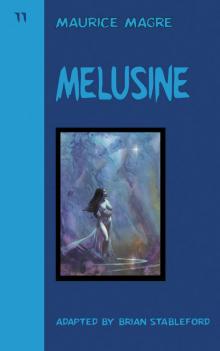 Melusine
Melusine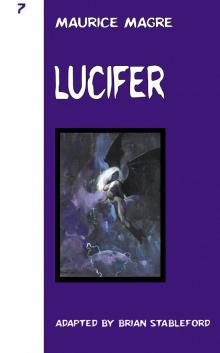 Lucifer
Lucifer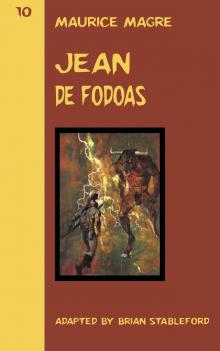 Jean de Fodoas
Jean de Fodoas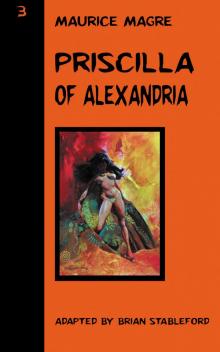 Priscilla of Alexandria
Priscilla of Alexandria The Blood of Toulouse
The Blood of Toulouse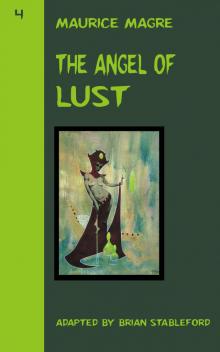 The Angel of Lust
The Angel of Lust